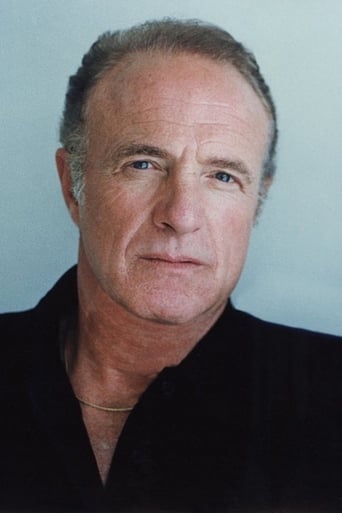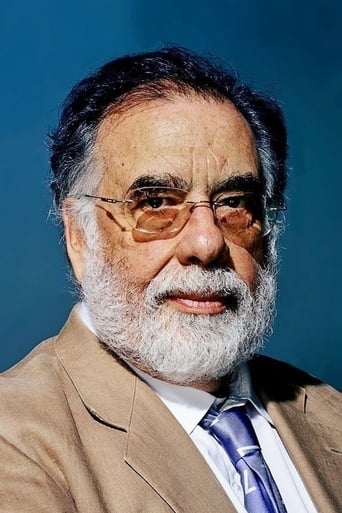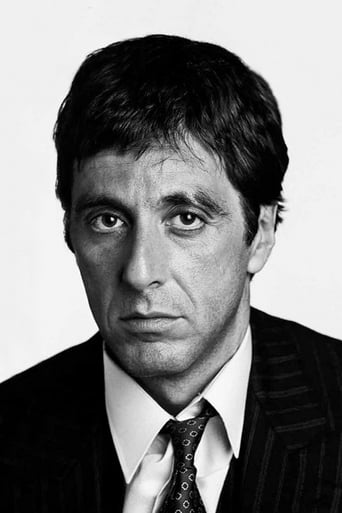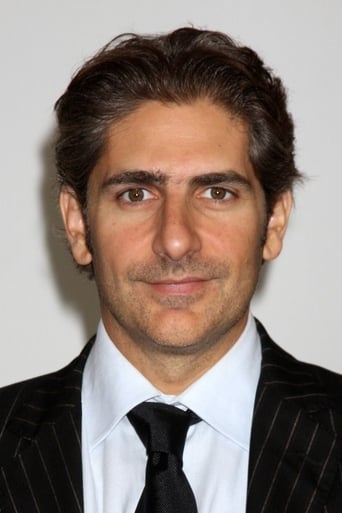Freaktana
A Major Disappointment
AshUnow
This is a small, humorous movie in some ways, but it has a huge heart. What a nice experience.
Janae Milner
Easily the biggest piece of Right wing non sense propaganda I ever saw.
Janis
One of the most extraordinary films you will see this year. Take that as you want.
boisethespian
Enjoyable and informative but sometimes choppy. I've always enjoyed Al Pachino's work, but, as a Marine I was taken aback and somewhat offended when he said that Michael joined the Army.
John T. Ryan
FILMS ABOUT FILMS are a certain genre that has long been with us. Some are done as a sort of promotional tool, finished and released before the initial run of the subject film and meant to pique the public's anticipation and interest. We can think of examples of this type in RETURN TO RAINTREE COUNTY and THE MAKING OF SUPERMAN:THE MOVIE.TODAY'S HONORED REVIEWEE does not fit into this category. Being that THE GODFATHER LEGACY was made nearly four decades after the original theatrical showing of THE GODFATHER, it must fit into another sub-genre classification.THIS SORT OF production centers on certain very special and successful movies that have become a part of our culture. They are the sort movie that we can watch over and over and still enjoy the hell out of them! IN ANOTHER SENSE, forays into every minute aspect of a film become a sort of extended version of the movie revue column of the daily newspapers. In this case, the rampant subjectivity of personal opinion can render the film to be overly biased and, by its very nature, far less illuminating to we, the loyal fans.IT IS OUR opinion that the production team has tactfully avoided any excesses in criticism and praise. The result is what we all crave; but so seldom realize. THE GODFATHER LEGACY is a well plotted examination of the great film series; which boldly and wisely brings interviews with those who participated in their making. They also included some expertise from the worlds of medical science and academia.IN THE END the production is highly informative as well as being valued for its entertainment value. As an example of what we mean: This Iish Kid (the writer) never realized that Frank Pentangelli changed his testimony because he wouldn't want his brother to witness such betrayal.BOTH SCHULTZ AND myself thought the brother from Sicily was a hostage of the Corleones. I guess I'll be an "Irisher" all my life!
smokehill retrievers
While I really did enjoy the various insights by the director & actors, I disagree very much with what all their opinions were of the basic story and "what it all meant." Basically, they all see Michael as a tragic figure, cursed because he did such ""unspeakable" acts during his life.Maybe they should actually watch their own movie, since I have a much different view -- and I've lost track of how many times I've watched the entire series ... 20? More, maybe.Michael didn't start this war -- it was thrust upon him by Solozzo, Tattaglia, Barzini & the rest. They started this, strictly to eliminate the Corleone family for opposing Solozzo's new project, and apparently all of the Five Families were involved. They also deliberately corrupted Michael's family (both blood and business partners) to further the elimination of the Corleone Family. The murders and assassination attempts are pretty obvious to anyone who's seen the films.These "evil acts" did not stem any inherent criminality or evil intent on Michael's part. Keep in mind that he wanted nothing to do with the family business and avoided it completely -- until the murderous machinations of the Five Families forced him to act TO PROTECT HIS FAMILY. No other motive is evident on his part, period. If he hadn't stepped in to stop the destrucion of his family, who would? Fredo? The Tooth Fairy?Everything stems from the evil acts of others, and he just did what was necessary to save those he loved, nothing more.Was Michael a tragic figure -- yes, obviously. But it was not his doing, and if he had NOT done what he thought necessary, give some thought as to what might have been the outcome, and whether any Corleone would have been left alive.
dy158
We may or may not realised it ourselves, but we may have quoted directly or indirectly what were first uttered in the 'Godfather' series of films at some point in our lives. Then there are the romanticising of the mafia world which we may or may not have been aware of it. But it is more than just how 'The Godfather' trilogy has infiltrated the popular culture consciousness, and how aspects of it has actually shape the way we look at capitalism and crime.It is a documentary which breaks down the various aspects of the trilogy into the making of the film, using the now-famous quotes from the three films to discuss their meaning behind their place in the wider context of the trilogy and its impact on the wider popular culture consciousness, and explaining how does the various pivotal scenes blend in to the wider American context, the Italian-American culture and the prominent, social issues of the day when the films were released.The first film started out as a novel from writer Mario Puzo on the tale of a fictional mafia family living in New York City in the late 1940s and the people they met and knew along the way. The novel itself was already a bestseller, before the inevitable film adaptation was in the works. With the commercial success also being replicated on screen, it may amaze the fan of how the task to bring the novel to screen came about. When Francis Ford Coppola who was then a young struggling director came on board, he had originally taken on the task to pay the bills. But it will lead to a constant struggle with Paramount Pictures, including who to cast for the major characters especially on who to play the youngest son of the Corleone clan in Michael. Coppola wanted Al Pacino, but Paramount Pictures had their doubts on the then-young actor.The re-telling of the struggle to get Al Pacino as Michael is just one of the anecdotes over the film production process of the struggles Francis Ford Coppola has, with the showing of how during the screen testing process, how those auditioning to be Michael fared alongside Diane Keaton (who plays Michael Corleone's girlfriend Kay Adams and eventually his wife) in a scene where they had a dialogue. But it is not always about the struggles, as what happened in the filming process and what those involved in the film had to say has its various light-hearted moments like how Marlo Brando, who plays the original Don and the head of the Corleone clan, would joke around in between filming.Using the famous quotes to explore the various scenes and how it fits into the wider context of the world of popular culture and aspects of Italian-American life, it uses quotes which has become part of the wider English language lexicon to explain its impact on our consciousness and its meaning behind aspects of the Italian-American culture. The quotes which has become part of how capitalism is viewed in the wider context are explored like Don Vito Corleone (Marlo Brando) saying in the first film of 'I'm going to make him an offer he can't refuse' and Michael Corleone (Al Pacino) saying in the second instalment of 'keep your friends close, but your enemies closer'. These are quotes which we have come to take for granted, but it is always fascinating how it would come to take on a life of its own. But there are quotes like 'women are more dangerous than shotguns', which delves into how the role of women is being viewed at least in the traditional Italian-American family structure as explored via the Corleones' youngest child and only daughter Connie (Talia Shire), Apollonia who was Michael's wife briefly during his time hiding in Sciliy given the documentary also explores the social movements of the 70s which coincided with the timing of the release of the first two films. Then there is also how the original Don (Brando) did not want his youngest son Michael (Pacino) to follow in his footsteps and its significance in the wider context when it comes to the world of mafia in the United States of how the parents do not want their children to follow in their footsteps given the context of the 'business' they were dealing with.But they are also a window to the wider society as a whole, newly-arrived immigrants trying to live out the American dream, the concept of family and women in the context of the 'Godfather' trilogy. It has many layers and aspects with the three films being analysed from various angles from the people who made the film like director Francis Ford Coppola to the main cast members like James Caan (who plays the oldest Corleone son Sonny), Al Pacino and Talia Shire, the law enforcement members who look at the films through the prism of the mafia operating in 1940s New York City which the novel, and the first film was set, the various academics looking at the film in the context of the American and Italian-American psyche and the transformation of Michael Corleone from the outsider in his own family to becoming the new Don after his father's death, and even former real Mafia members who give a sense of perspective of what it is like in that kind of world and how it is being reflected in the films and in return, how the commercial successes of the films has affected their own lives.At the end of it all, it does open a window into why the films still endears in popular culture even since the release of the first film in 1972 to the final instalment in 1990 after director Francis Ford Coppola was initially reluctant to direct the sequels, and the unlikely fans the films has gained.




